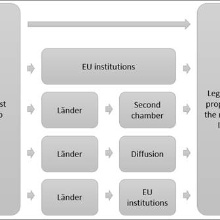Funding:
Deutsche Forschungsgemeinschaft (DFG)
Principal Investigator:
Prof. Dr. Patrick Bernhagen
Research Fellow:
Dr. Florian Spohr
Student Assistants:
Krispin Krüger
Carina Schuster
It the European multilevel system, interest groups have to choose levels and arenas for political advocacy (Mazey and Richardson 2001; Richardson 2000). Domestic access and multilevel venue shopping are positively correlated (Beyers and Kerremans 2012: 278). One reason for this might be that groups address more proximate arenas first before moving to arenas further afield, e.g. at other levels of governance. This is especially the case in neo-corporatist countries, such as Germany, where interest group access to policymakers is highly institutionalized (ibid. 283). Indeed, scholars have found that the neo-corporatist tradition of interest representation is reflected in the way associations work in the EU arenas (e.g. Schmedes 2008; Eising 2007b; Eising 2005; Eising 2004). However, while research on the relationship between the national and the supranational level in the context of interest group politics is quite developed, the subnational level of policymaking is frequently overlooked in the literature on interest group politics. An exception is a recent study by López and Tatham (2018), which finds that subnational interest groups adapt organizationally and strategically to the European environment. What remains unknown is how and under what circumstances organized interests engage in multiple arenas, change from one arena to another, or settle on a given arena.
In this research project, we therefore investigate how organized interests coordinate their political activities across different levels in multilevel systems. We define interest groups as collective actors that communicate their interests to the political system without seeking public offices or competing in elections (Beyers et al. 2008). Focusing on legislative lobbying, we include both business interest groups and associations representing diffuse interests (Baumgartner and Leech 1998) as well as institutions and firms (Schlozman and Tierney 1986) as organized interests in the analysis. The project will contribute deeper insights to three major lines of research; (1) research on subnational lobbying and lobbying in federal systems (e.g. Lang and Schneider 2007, Van den Hoven et al. 2003), (2) the literature on lobbying in the multilevel system of Europe (Dür and Mateo 2016, Tatham 2014), and (3), research on venue choice and arena entry (Constantelos 2010, Binderkrantz, et al. 2015). To do so, we investigate the case of Germany. We contextualize these literatures within the arena framework. We define an arena as a political space that is constituted by (1) a formal and/or informal rule system governing the admission and the behavior of actors, (2) a set of actors seeking to shape political outcomes, and (3) the conflict, alignment, and exchange patterns among these actors.


